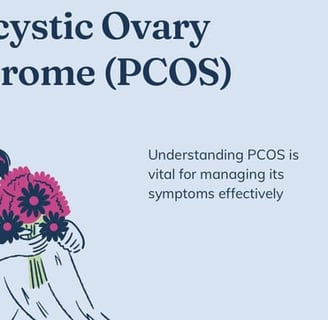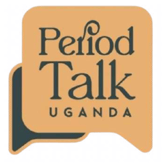Understanding PCOS (Polycystic Ovarian Syndrome)
PCOS is a prevalent hormonal disorder affecting women during their reproductive years. It stems from hormonal imbalances that disrupt ovulation and elevate masculine hormone levels.
5/1/20254 min read


PCOS is a prevalent hormonal disorder affecting women during their reproductive years. It stems from hormonal imbalances that disrupt ovulation and elevate masculine hormone levels.
Despite its name, the "polycystic" part can be confusing. It actually refers to multiple undeveloped follicles on the ovaries visible during ultrasound examination—not true cysts. These follicles develop when ovulation problems prevent egg-containing follicles from fully maturing. In normal ovulation, several follicles begin developing simultaneously, with one eventually releasing an egg. However, in PCOS, these follicles often stall in development, leading to ovulation difficulties and subsequent hormone imbalances.
It's important to note that not every woman with PCOS displays polycystic ovaries on imaging, and this feature isn't required for diagnosis. The condition manifests differently among women, with symptom variety and severity differing widely.
Essential PCOS Symptom Checklist
Polycystic Ovary Syndrome affects over 20% of reproductive-age women, many undiagnosed. Consider medical consultation if you recognize these symptoms:
Primary Diagnostic Criteria
Menstrual Irregularities: Experiencing fewer than 8 periods annually or having unusually long, light, or heavy menstrual cycles.
Elevated Testosterone: Blood tests showing high levels of this male hormone.
Polycystic Ovaries: Ultrasound revealing multiple immature follicles on ovaries.
A diagnosis typically requires at least two of these three indicators.
Additional Common Symptoms
Acne: Facial, chest, or back breakouts affecting 37-60% of women with PCOS, indicating hormonal imbalance.
Excessive Hair Growth (Hirsutism): Unusual hair development on face, chest, back, or abdomen, affecting 60-80% of women with PCOS due to increased androgens.
Weight Management Issues: Difficulty losing weight or experiencing unexplained weight gain, often linked to insulin resistance. Approximately 28% of overweight women have PCOS.
Fertility Challenges: Difficulty conceiving due to irregular ovulation.
Scalp Hair Thinning: Noticeable hair loss exceeding the typical 50-100 strands daily.
Skin Changes: Dark skin patches or skin tags, often associated with insulin resistance.
Energy Depletion: Persistent fatigue, particularly mid-morning and mid-afternoon energy crashes.
Food Cravings: Frequent intense hunger for specific foods, often related to insulin resistance.
Emotional Fluctuations: Mood swings, anxiety, or depression, which commonly accompany PCOS.
If several symptoms resonate with your experience, tracking these concerns and consulting healthcare professionals is crucial. Early detection and personalized treatment significantly improve quality of life. Though complex, PCOS can be effectively managed with proper support and lifestyle modifications.
PCOS Types: Identifying Your Variation
PCOS manifests in four distinct variations:
Adrenal PCOS
Caused by excessive androgen production from the adrenal glands, this type typically features excess hair growth, acne, and irregular menstruation. Treatment often focuses on balancing androgen levels through herbal remedies and lifestyle adjustments.
Insulin-Resistant PCOS
The most common form, occurring when the body demonstrates resistance to insulin, leading to elevated insulin levels. This excess insulin triggers increased androgen production by the ovaries, resulting in weight gain, hair loss, and acne. Management typically involves dietary modifications and herbs that support blood sugar balance and reduce inflammation.
Inflammatory PCOS
Characterized by body-wide inflammation leading to insulin resistance and androgen excess. Symptoms often include acne, hair loss, and weight gain. Treatment approaches frequently incorporate anti-inflammatory herbs and dietary changes to reduce inflammation and balance hormones.
Pill-Induced PCOS
Develops after discontinuing hormonal birth control pills. These medications regulate menstrual cycles and prevent ovarian cyst formation. When stopped, the body may require adjustment time, potentially leading to ovarian cyst development. Management often includes herbs and dietary modifications supporting natural hormonal balance and menstrual regulation.
PCOS Causes
The exact origins of PCOS remain incompletely understood, but likely involve a combination of:
Genetic Factors: Family history increases risk, though specific genes remain unidentified.
Hormonal Imbalances: Higher-than-normal androgen levels can lead to increased follicle production and potential cyst formation.
Insulin Resistance: Reduced insulin effectiveness leads to elevated bloodstream insulin, prompting increased androgen production and symptoms like acne, excess hair growth, and weight gain.
Chronic Inflammation: Higher inflammation levels contribute to insulin resistance and androgen excess.
Lifestyle Influences: Diet high in refined carbohydrates and sugars can worsen insulin resistance, while sedentary habits contribute to weight gain and inflammation.
Health Complications
Without treatment, PCOS can progress to serious health issues:
Fertility Problems: Irregular periods and lack of ovulation complicate conception.
Diabetes Risk: Insulin resistance increases type 2 diabetes likelihood.
Cardiovascular Concerns: Higher risk of high blood pressure, elevated cholesterol, and heart attacks due to insulin resistance and inflammation.
Endometrial Cancer: Increased risk due to excess estrogen in women with irregular ovulation.
Sleep Apnea: PCOS associates with breathing disruptions during sleep, causing daytime fatigue.
Mental Health Impacts: Higher rates of depression and anxiety due to PCOS effects on physical health, fertility, and life quality.
Diagnosis Approach
PCOS diagnosis requires multiple assessment methods:
Medical History Review: Evaluation of menstrual patterns, symptoms, and family history.
Physical Examination: Assessment for androgen excess signs like excessive hair growth, acne, and hair loss.
Blood Testing: Hormone level checks (androgens, estrogen, progesterone) and screening for similar-presenting conditions like thyroid disorders.
Ultrasound Imaging: Evaluation for ovarian cysts, though neither all women with PCOS have cysts, nor do all women with cysts have PCOS.
PCOS Hormone Profiles
While hormone levels vary widely among women with PCOS, common patterns include:
Elevated Androgens: Testosterone exceeding 2.7 nmol/L (78 ng/dL) and/or DHEAS above 4,500 ng/mL often suggest PCOS.
Elevated LH: LH levels higher than FSH, or an LH:FSH ratio exceeding 2:1.
Insulin Resistance Markers: Fasting insulin above 15-20 microU/mL or HOMA-IR exceeding 2.5 often indicate insulin resistance.
Note that diagnosis requires more than hormone testing alone, typically combining symptoms, physical examination, and laboratory results.
Taking Action
If you suspect PCOS, document your concerns before consulting healthcare providers. Women's health conditions are frequently misdiagnosed, understudied, and undertreated due to education gaps, gender bias, and systemic healthcare issues. Women's medical concerns face higher dismissal rates than men's. Remember to advocate for yourself—you understand your body better than anyone else.
